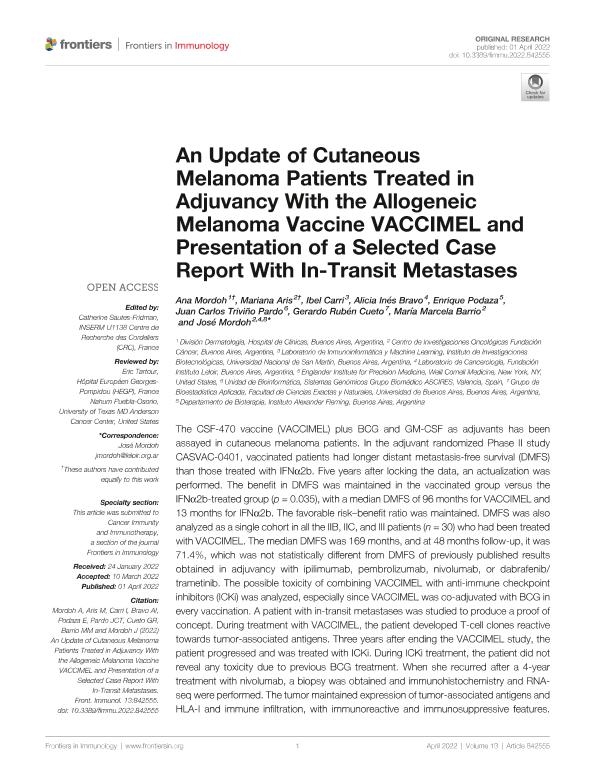Mostrar el registro sencillo del ítem
dc.contributor.author
Mordoh, Ana
dc.contributor.author
Aris, Mariana

dc.contributor.author
Carri, Ibel

dc.contributor.author
Bravo, Alicia Ines

dc.contributor.author
Podaza, Enrique Arturo

dc.contributor.author
Triviño Pardo, Juan Carlos
dc.contributor.author
Cueto, Gerardo Ruben

dc.contributor.author
Barrio, Maria Marcela

dc.contributor.author
Mordoh, Jose

dc.date.available
2022-07-05T19:05:29Z
dc.date.issued
2022-04
dc.identifier.citation
Mordoh, Ana; Aris, Mariana; Carri, Ibel; Bravo, Alicia Ines; Podaza, Enrique Arturo; et al.; An update of cutaneous melanoma patients treated in adjuvancy with the allogeneic melanoma vaccine vaccimel and presentation of a selected case report with in-transit metastases; Frontiers Media; Frontiers in Immunology; 13; 4-2022; 1-11
dc.identifier.issn
1664-3224
dc.identifier.uri
http://hdl.handle.net/11336/161343
dc.description.abstract
The CSF-470 vaccine (VACCIMEL) plus BCG and GM-CSF as adjuvants has been assayed in cutaneous melanoma patients. In the adjuvant randomized Phase II study CASVAC-0401, vaccinated patients had longer distant metastasis-free survival (DMFS) than those treated with IFNa2b. Five years after locking the data, an actualization was performed. The benefit in DMFS was maintained in the vaccinated group versus the IFNa2b-treated group (p = 0.035), with a median DMFS of 96 months for VACCIMEL and 13 months for IFNa2b. The favorable risk–benefit ratio was maintained. DMFS was also analyzed as a single cohort in all the IIB, IIC, and III patients (n = 30) who had been treated with VACCIMEL. The median DMFS was 169 months, and at 48 months follow-up, it was 71.4%, which was not statistically different from DMFS of previously published results obtained in adjuvancy with ipilimumab, pembrolizumab, nivolumab, or dabrafenib/ trametinib. The possible toxicity of combining VACCIMEL with anti-immune checkpoint inhibitors (ICKi) was analyzed, especially since VACCIMEL was co-adjuvated with BCG in every vaccination. A patient with in-transit metastases was studied to produce a proof of concept. During treatment with VACCIMEL, the patient developed T-cell clones reactive towards tumor-associated antigens. Three years after ending the VACCIMEL study, the patient progressed and was treated with ICKi. During ICKi treatment, the patient did not reveal any toxicity due to previous BCG treatment. When she recurred after a 4-year treatment with nivolumab, a biopsy was obtained and immunohistochemistry and RNAseq were performed. The tumor maintained expression of tumor-associated antigens and HLA-I and immune infiltration, with immunoreactive and immunosuppressive features VACCIMEL plus BCG and GM-CSF is an effective treatment in adjuvancy for stages IIB, IIC, and III cutaneous melanoma patients, and it is compatible with subsequent treatments with ICKi.
dc.format
application/pdf
dc.language.iso
eng
dc.publisher
Frontiers Media

dc.rights
info:eu-repo/semantics/openAccess
dc.rights.uri
https://creativecommons.org/licenses/by/2.5/ar/
dc.subject
IMMUNE CHECKPOINT INHIBITOR (ICKI)
dc.subject
ADJUVANCY
dc.subject
BACILLE CALMETTE-GUÉRIN (BCG)
dc.subject
CUTANEOUS MELANOMA (CM)
dc.subject
THERAPEUTIC VACCINE
dc.subject
VACCIMEL
dc.subject.classification
Oncología

dc.subject.classification
Medicina Clínica

dc.subject.classification
CIENCIAS MÉDICAS Y DE LA SALUD

dc.title
An update of cutaneous melanoma patients treated in adjuvancy with the allogeneic melanoma vaccine vaccimel and presentation of a selected case report with in-transit metastases
dc.type
info:eu-repo/semantics/article
dc.type
info:ar-repo/semantics/artículo
dc.type
info:eu-repo/semantics/publishedVersion
dc.date.updated
2022-06-30T19:05:01Z
dc.journal.volume
13
dc.journal.pagination
1-11
dc.journal.pais
Suiza

dc.journal.ciudad
Lausana
dc.description.fil
Fil: Mordoh, Ana. Universidad de Buenos Aires. Facultad de Medicina. Hospital de Clínicas General San Martín; Argentina
dc.description.fil
Fil: Aris, Mariana. Consejo Nacional de Investigaciones Científicas y Técnicas; Argentina. Fundación Cáncer. Centro de Investigaciones Oncológicas; Argentina
dc.description.fil
Fil: Carri, Ibel. Consejo Nacional de Investigaciones Científicas y Técnicas. Centro Científico Tecnológico Conicet - La Plata. Instituto de Investigaciones Biotecnológicas. Universidad Nacional de San Martín. Instituto de Investigaciones Biotecnológicas; Argentina
dc.description.fil
Fil: Bravo, Alicia Ines. Fundación Instituto Leloir; Argentina
dc.description.fil
Fil: Podaza, Enrique Arturo. Consejo Nacional de Investigaciones Científicas y Técnicas; Argentina. Weill Cornell Medicine; Estados Unidos
dc.description.fil
Fil: Triviño Pardo, Juan Carlos. Sistemas Genómicos Grupo Biomédico Ascires. Unidad de Bioinformática; España
dc.description.fil
Fil: Cueto, Gerardo Ruben. Consejo Nacional de Investigaciones Científicas y Técnicas; Argentina. Universidad de Buenos Aires. Facultad de Ciencias Exactas y Naturales; Argentina
dc.description.fil
Fil: Barrio, Maria Marcela. Consejo Nacional de Investigaciones Científicas y Técnicas; Argentina. Fundación Cáncer. Centro de Investigaciones Oncológicas; Argentina
dc.description.fil
Fil: Mordoh, Jose. Consejo Nacional de Investigaciones Científicas y Técnicas; Argentina. Fundación Cáncer. Centro de Investigaciones Oncológicas; Argentina. Instituto Alexander Fleming; Argentina. Fundación Instituto Leloir; Argentina
dc.journal.title
Frontiers in Immunology
dc.relation.alternativeid
info:eu-repo/semantics/altIdentifier/url/https://www.frontiersin.org/articles/10.3389/fimmu.2022.842555/full
dc.relation.alternativeid
info:eu-repo/semantics/altIdentifier/doi/https://doi.org/10.3389/fimmu.2022.842555
Archivos asociados
